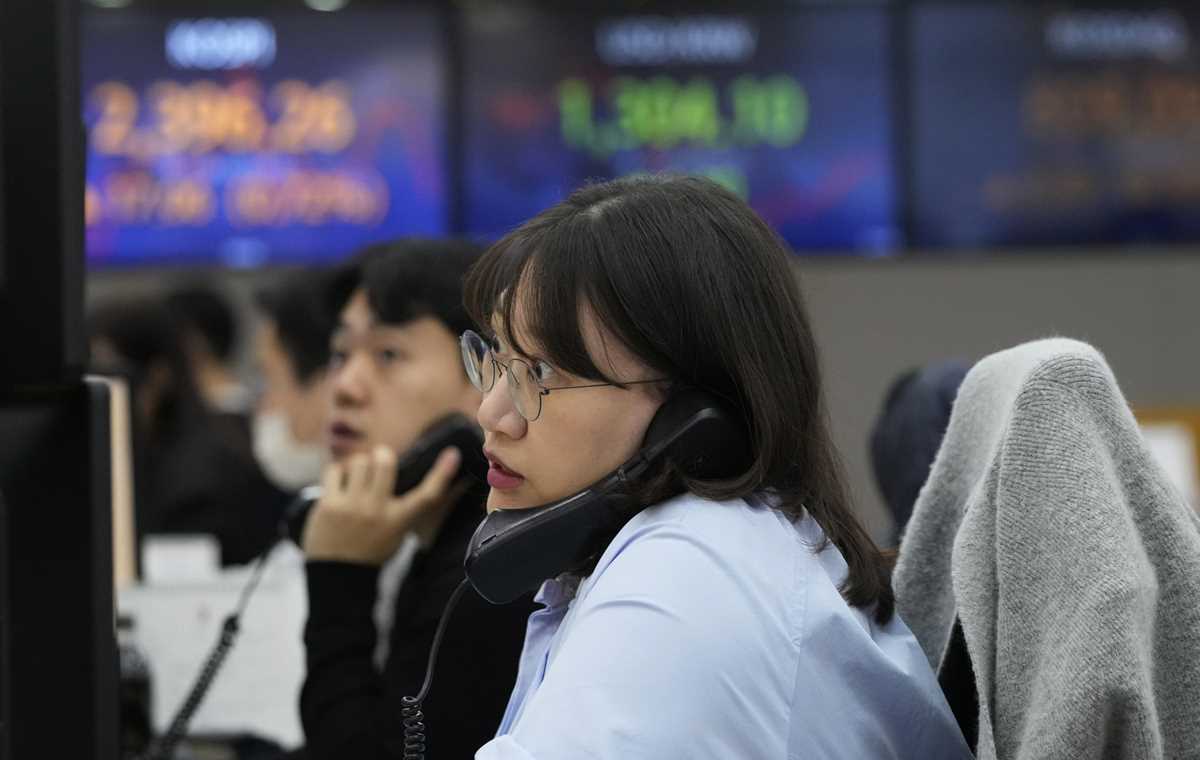 A currency trader watches monitors at the foreign exchange dealing room of the KEB Hana Bank headquarters in Seoul, South Korea, Tuesday, March 21, 2023. sian stock markets followed Wall Street higher on Tuesday ahead of a Federal Reserve decision on another possible interest rate hike amid worries about global banks. (AP Photo/Ahn Young-joon)
A currency trader watches monitors at the foreign exchange dealing room of the KEB Hana Bank headquarters in Seoul, South Korea, Tuesday, March 21, 2023. sian stock markets followed Wall Street higher on Tuesday ahead of a Federal Reserve decision on another possible interest rate hike amid worries about global banks. (AP Photo/Ahn Young-joon)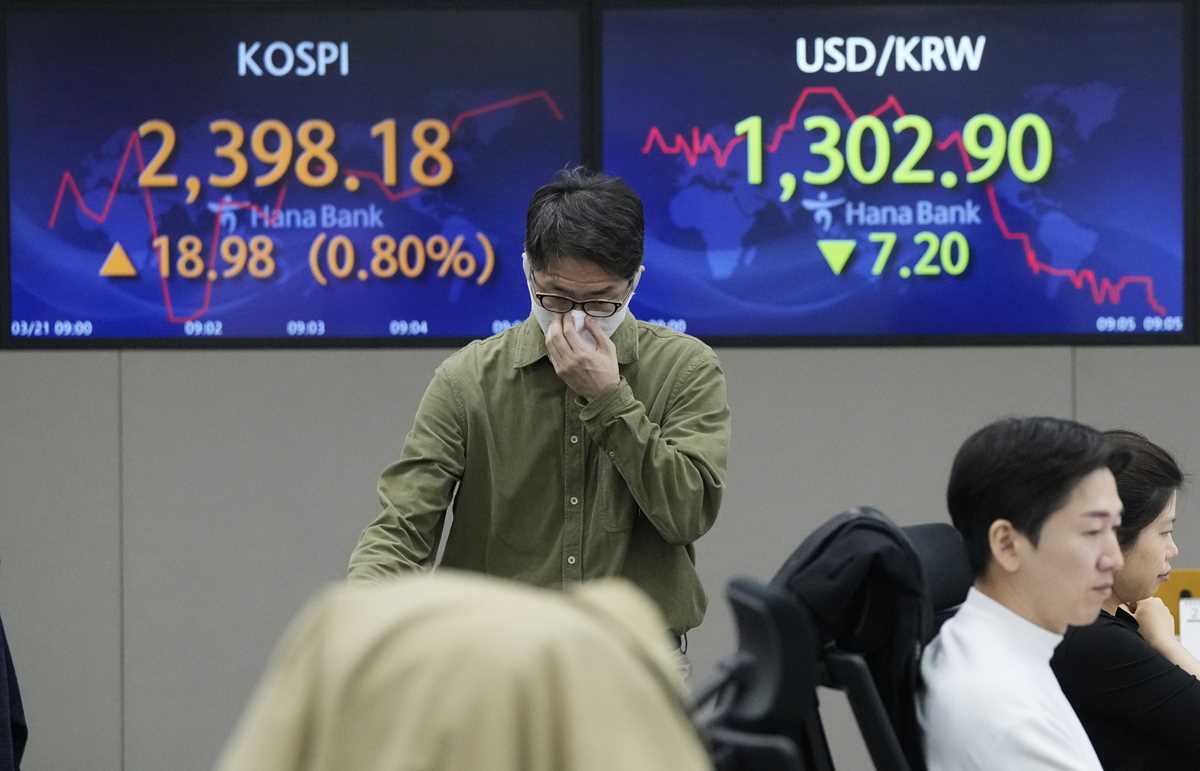 A currency trader passes by the screens showing the Korea Composite Stock Price Index (KOSPI), left, and the foreign exchange rate between U.S. dollar and South Korean won at the foreign exchange dealing room of the KEB Hana Bank headquarters in Seoul, South Korea, Tuesday, March 21, 2023. sian stock markets followed Wall Street higher on Tuesday ahead of a Federal Reserve decision on another possible interest rate hike amid worries about global banks. (AP Photo/Ahn Young-joon)
A currency trader passes by the screens showing the Korea Composite Stock Price Index (KOSPI), left, and the foreign exchange rate between U.S. dollar and South Korean won at the foreign exchange dealing room of the KEB Hana Bank headquarters in Seoul, South Korea, Tuesday, March 21, 2023. sian stock markets followed Wall Street higher on Tuesday ahead of a Federal Reserve decision on another possible interest rate hike amid worries about global banks. (AP Photo/Ahn Young-joon) A currency trader watches monitors at the foreign exchange dealing room of the KEB Hana Bank headquarters in Seoul, South Korea, Tuesday, March 21, 2023. sian stock markets followed Wall Street higher on Tuesday ahead of a Federal Reserve decision on another possible interest rate hike amid worries about global banks. (AP Photo/Ahn Young-joon)
A currency trader watches monitors at the foreign exchange dealing room of the KEB Hana Bank headquarters in Seoul, South Korea, Tuesday, March 21, 2023. sian stock markets followed Wall Street higher on Tuesday ahead of a Federal Reserve decision on another possible interest rate hike amid worries about global banks. (AP Photo/Ahn Young-joon)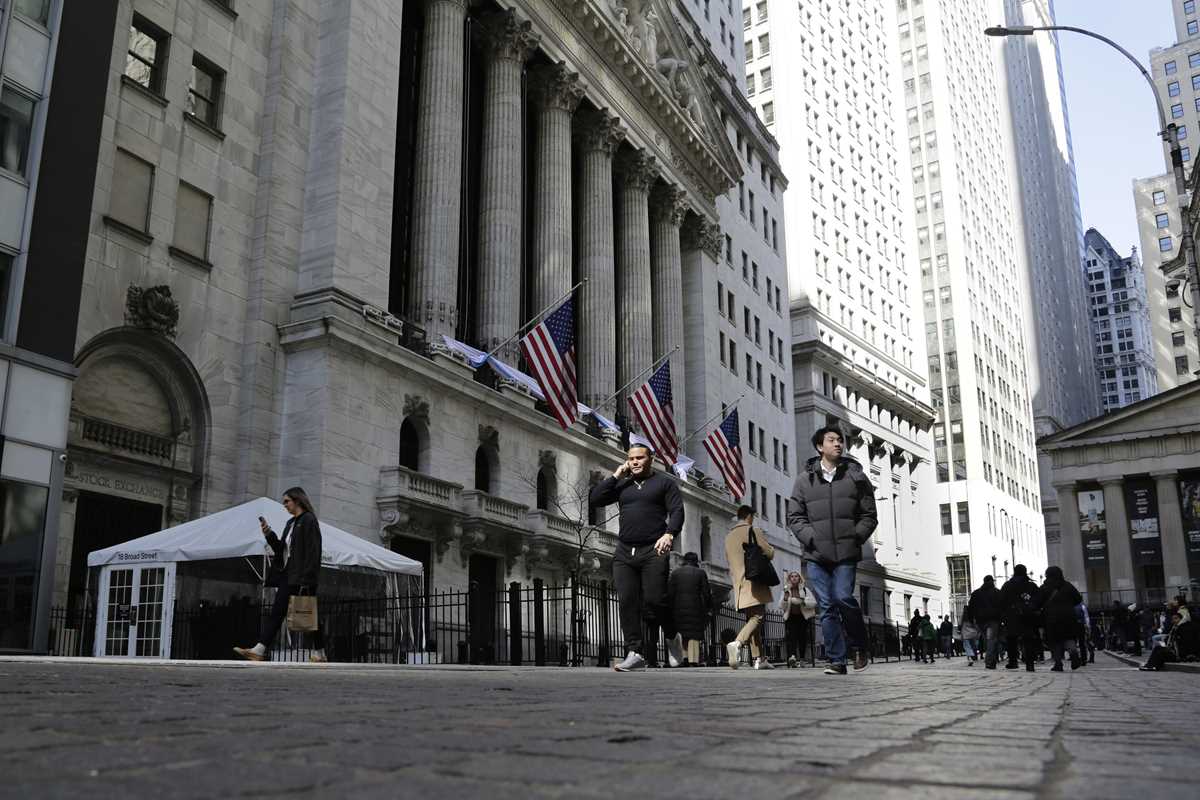 Traders work on the floor at the New York Stock Exchange in New York, Tuesday, Oct. 4, 2022. (AP Photo/Seth Wenig, File)
Traders work on the floor at the New York Stock Exchange in New York, Tuesday, Oct. 4, 2022. (AP Photo/Seth Wenig, File)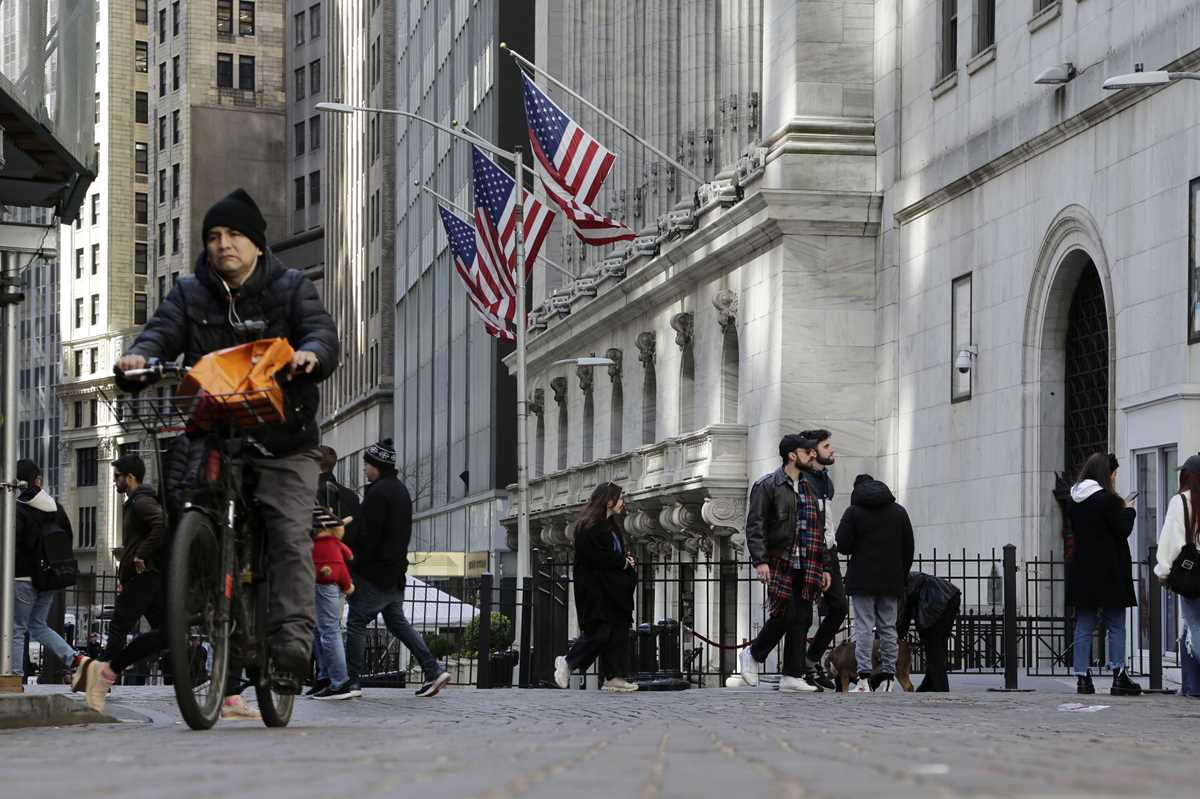 Traders work on the floor at the New York Stock Exchange in New York, Tuesday, Jan. 24, 2023. (AP Photo/Seth Wenig)
Traders work on the floor at the New York Stock Exchange in New York, Tuesday, Jan. 24, 2023. (AP Photo/Seth Wenig) People pass the front of the New York Stock Exchange in New York, Tuesday, March 21, 2023. Stocks are rising on Wall Street, including the banks most beaten down by the industry's crisis. (AP Photo/Peter Morgan
People pass the front of the New York Stock Exchange in New York, Tuesday, March 21, 2023. Stocks are rising on Wall Street, including the banks most beaten down by the industry's crisis. (AP Photo/Peter Morgan People pass the front of the New York Stock Exchange in New York, Tuesday, March 21, 2023. Stocks are rising on Wall Street, including the banks most beaten down by the industry's crisis. (AP Photo/Peter Morgan
People pass the front of the New York Stock Exchange in New York, Tuesday, March 21, 2023. Stocks are rising on Wall Street, including the banks most beaten down by the industry's crisis. (AP Photo/Peter Morgan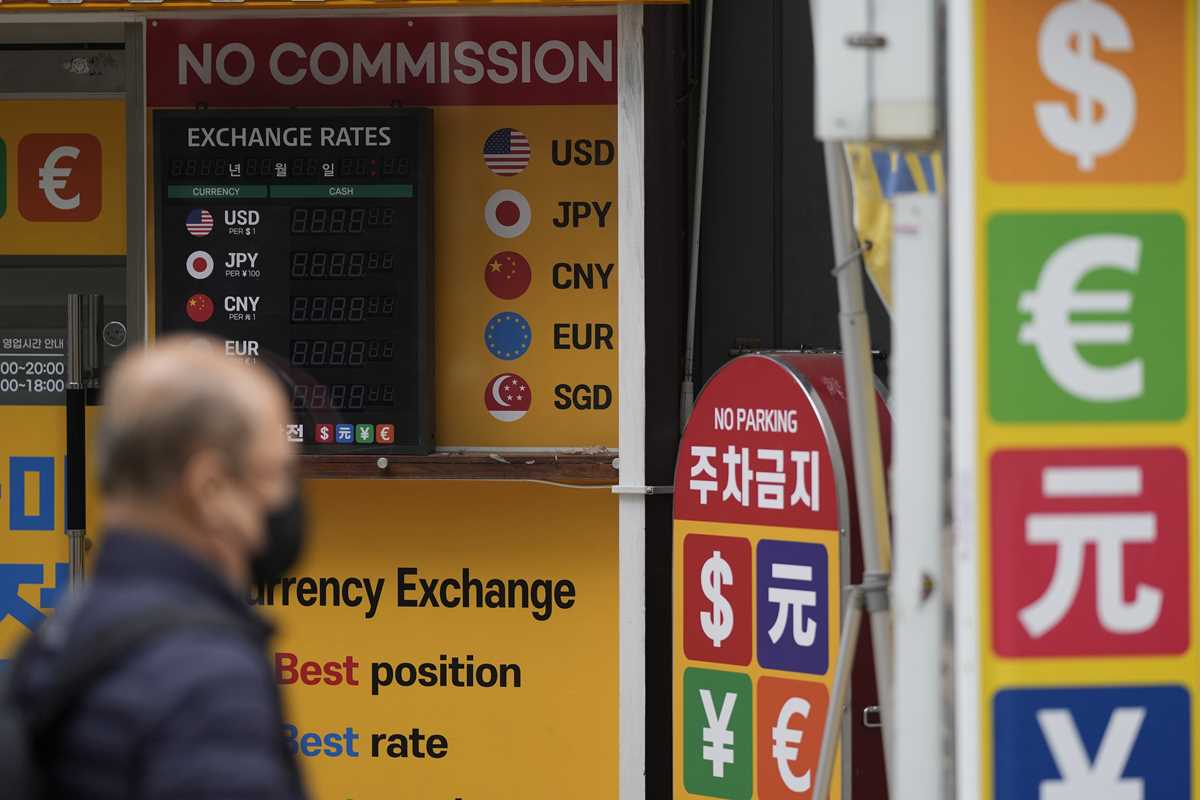 A man wearing a face mask walks past an electronic foreign currency exchange rates in downtown Seoul, South Korea, Wednesday, March 22, 2023. Asian shares advanced Wednesday after a Wall Street rally led by the banks most beaten down by the industry’s crisis.(AP Photo/Lee Jin-man)
A man wearing a face mask walks past an electronic foreign currency exchange rates in downtown Seoul, South Korea, Wednesday, March 22, 2023. Asian shares advanced Wednesday after a Wall Street rally led by the banks most beaten down by the industry’s crisis.(AP Photo/Lee Jin-man)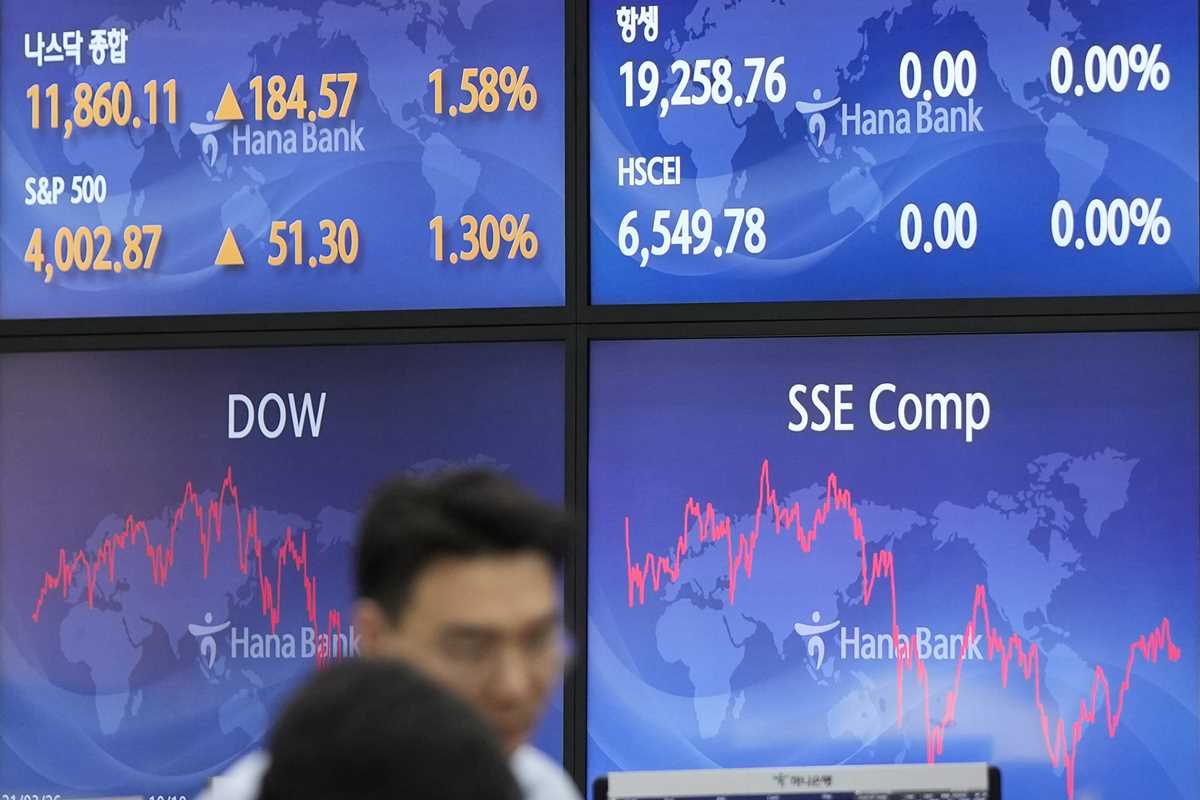 Currency traders talk near the screens at a foreign exchange dealing room in Seoul, South Korea, Wednesday, March 22, 2023. Asian shares advanced Wednesday after a Wall Street rally led by the banks most beaten down by the industry’s crisis.(AP Photo/Lee Jin-man)
Currency traders talk near the screens at a foreign exchange dealing room in Seoul, South Korea, Wednesday, March 22, 2023. Asian shares advanced Wednesday after a Wall Street rally led by the banks most beaten down by the industry’s crisis.(AP Photo/Lee Jin-man)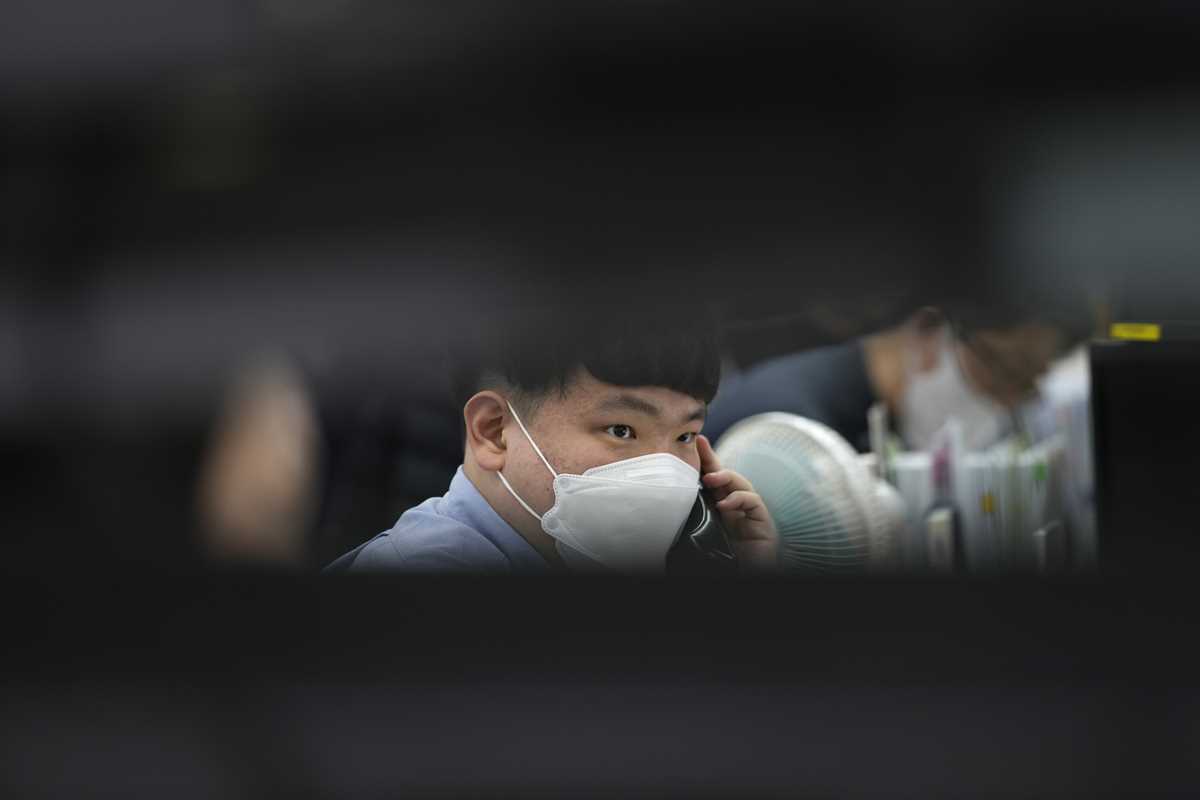 A currency trader talks on the phone at a foreign exchange dealing room in Seoul, South Korea, Wednesday, March 22, 2023. Asian shares advanced Wednesday after a Wall Street rally led by the banks most beaten down by the industry’s crisis.(AP Photo/Lee Jin-man)
A currency trader talks on the phone at a foreign exchange dealing room in Seoul, South Korea, Wednesday, March 22, 2023. Asian shares advanced Wednesday after a Wall Street rally led by the banks most beaten down by the industry’s crisis.(AP Photo/Lee Jin-man)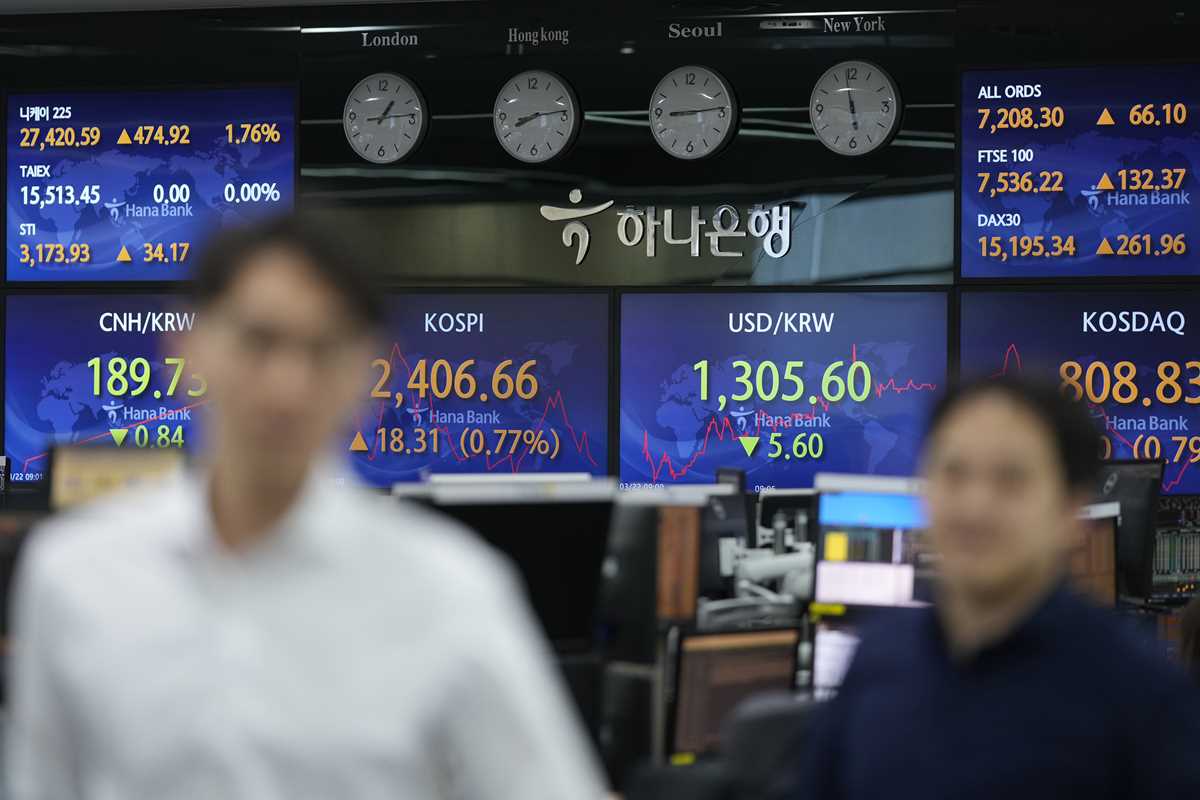 Currency traders walk near the screens showing the Korea Composite Stock Price Index (KOSPI), center left, and the foreign exchange rate between U.S. dollar and South Korean won at a foreign exchange dealing room in Seoul, South Korea, Wednesday, March 22, 2023. Asian shares advanced Wednesday after a Wall Street rally led by the banks most beaten down by the industry’s crisis.(AP Photo/Lee Jin-man)
Currency traders walk near the screens showing the Korea Composite Stock Price Index (KOSPI), center left, and the foreign exchange rate between U.S. dollar and South Korean won at a foreign exchange dealing room in Seoul, South Korea, Wednesday, March 22, 2023. Asian shares advanced Wednesday after a Wall Street rally led by the banks most beaten down by the industry’s crisis.(AP Photo/Lee Jin-man) Currency traders talk near the screens showing the Korea Composite Stock Price Index (KOSPI), left, and the foreign exchange rate between U.S. dollar and South Korean won at a foreign exchange dealing room in Seoul, South Korea, Wednesday, March 22, 2023. Asian shares advanced Wednesday after a Wall Street rally led by the banks most beaten down by the industry’s crisis.(AP Photo/Lee Jin-man)
Currency traders talk near the screens showing the Korea Composite Stock Price Index (KOSPI), left, and the foreign exchange rate between U.S. dollar and South Korean won at a foreign exchange dealing room in Seoul, South Korea, Wednesday, March 22, 2023. Asian shares advanced Wednesday after a Wall Street rally led by the banks most beaten down by the industry’s crisis.(AP Photo/Lee Jin-man)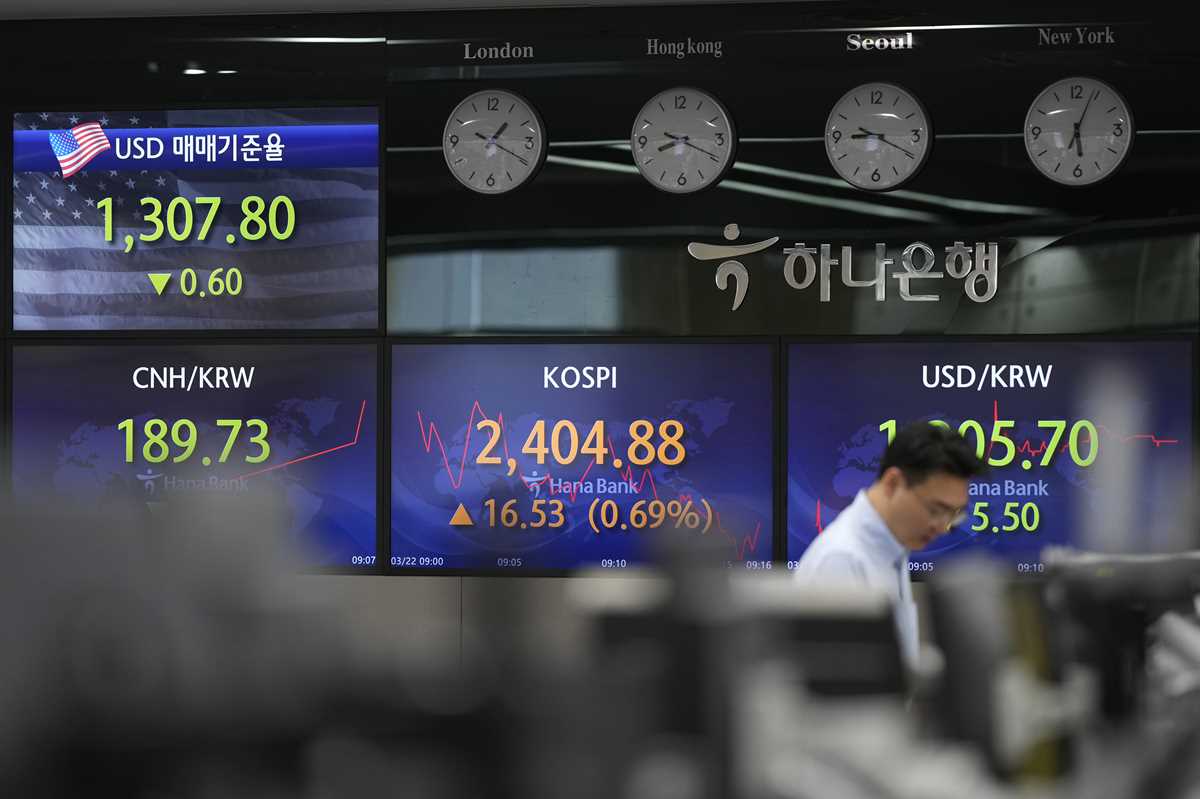 A currency trader stands near the screens showing the Korea Composite Stock Price Index (KOSPI), center, and the foreign exchange rate between U.S. dollar and South Korean won at a foreign exchange dealing room in Seoul, South Korea, Wednesday, March 22, 2023. Asian shares advanced Wednesday after a Wall Street rally led by the banks most beaten down by the industry’s crisis.(AP Photo/Lee Jin-man)
A currency trader stands near the screens showing the Korea Composite Stock Price Index (KOSPI), center, and the foreign exchange rate between U.S. dollar and South Korean won at a foreign exchange dealing room in Seoul, South Korea, Wednesday, March 22, 2023. Asian shares advanced Wednesday after a Wall Street rally led by the banks most beaten down by the industry’s crisis.(AP Photo/Lee Jin-man)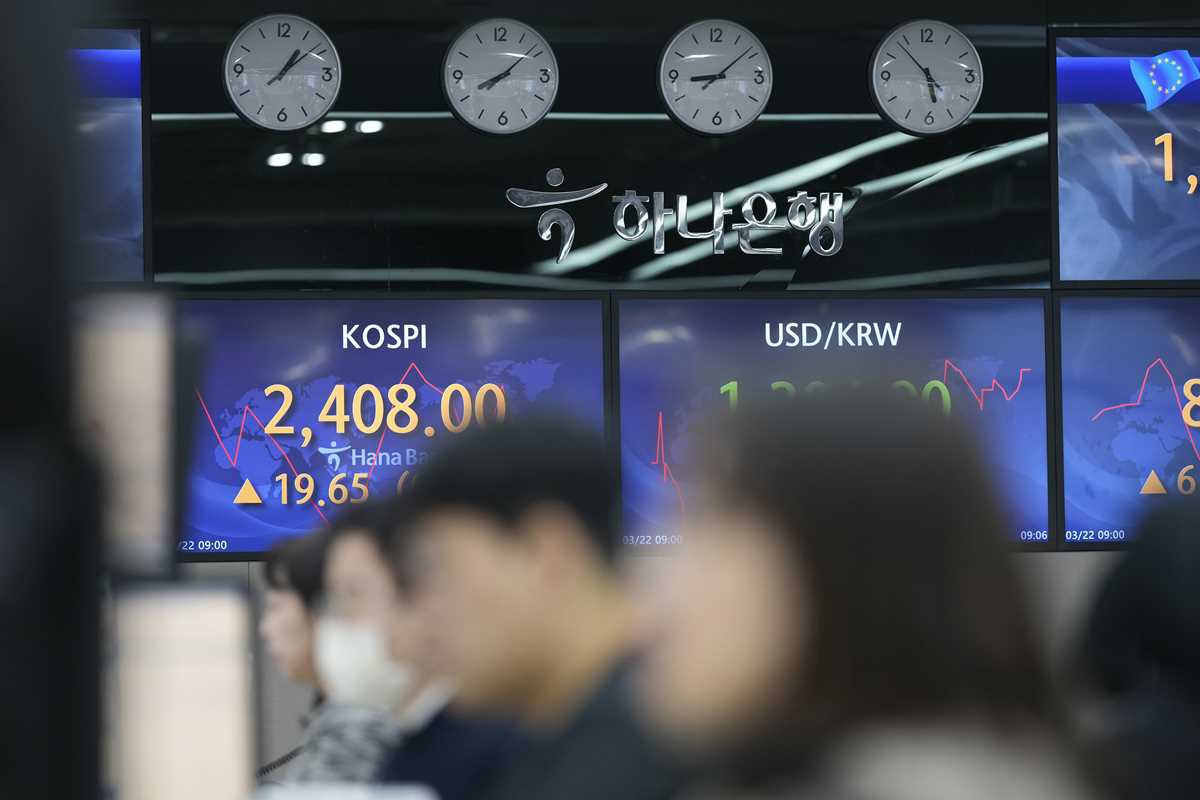 Currency traders watch their computer monitors near the screens showing the Korea Composite Stock Price Index (KOSPI), left, and the foreign exchange rate between U.S. dollar and South Korean won at a foreign exchange dealing room in Seoul, South Korea, Wednesday, March 22, 2023. Asian shares advanced Wednesday after a Wall Street rally led by the banks most beaten down by the industry’s crisis.(AP Photo/Lee Jin-man)
Currency traders watch their computer monitors near the screens showing the Korea Composite Stock Price Index (KOSPI), left, and the foreign exchange rate between U.S. dollar and South Korean won at a foreign exchange dealing room in Seoul, South Korea, Wednesday, March 22, 2023. Asian shares advanced Wednesday after a Wall Street rally led by the banks most beaten down by the industry’s crisis.(AP Photo/Lee Jin-man)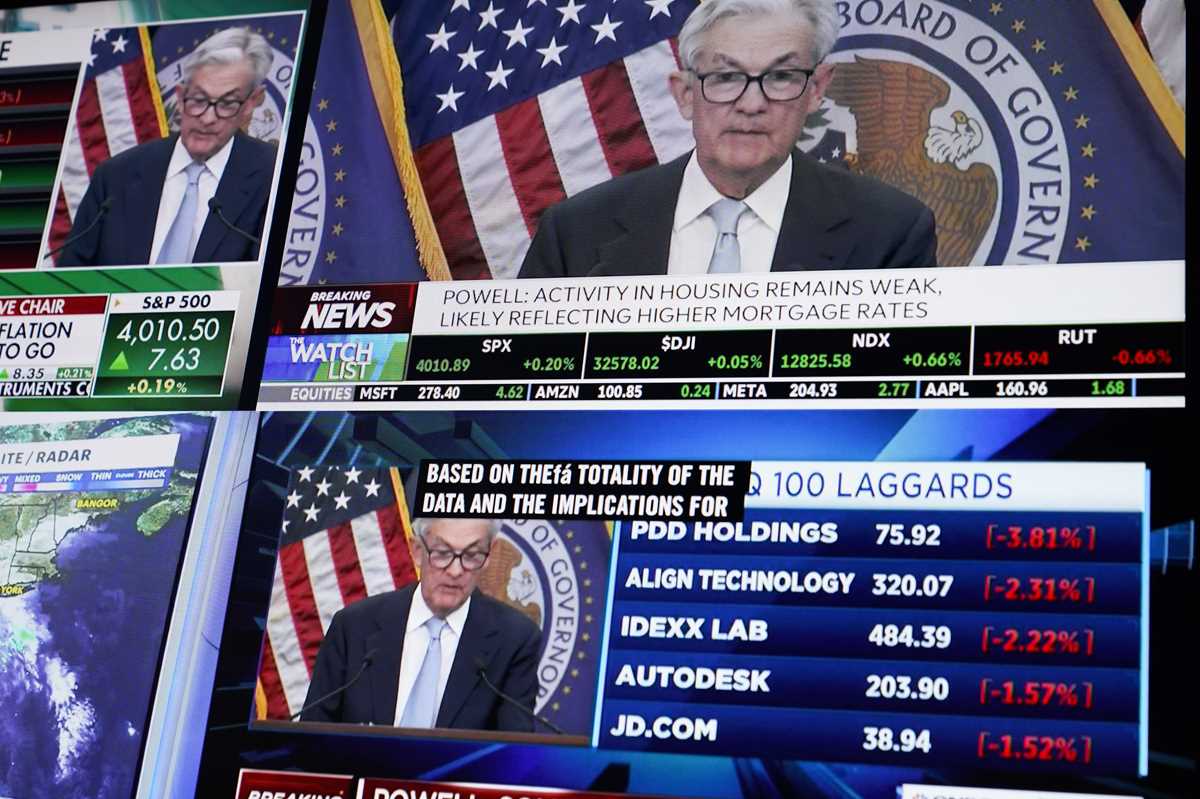 The New York Stock Exchange on Wednesday, June 29, 2022 in New York. (AP Photo/Julia Nikhinson, File)
The New York Stock Exchange on Wednesday, June 29, 2022 in New York. (AP Photo/Julia Nikhinson, File) People pass the front of the New York Stock Exchange in New York, on Wednesday, March 22, 2023. European shares have opened mixed after a day of gains in Asia ahead of a decision by the Federal Reserve on interest rates. (AP Photo/Peter Morgan
People pass the front of the New York Stock Exchange in New York, on Wednesday, March 22, 2023. European shares have opened mixed after a day of gains in Asia ahead of a decision by the Federal Reserve on interest rates. (AP Photo/Peter Morgan People pass the front of the New York Stock Exchange in New York, on Wednesday, March 22, 2023. European shares have opened mixed after a day of gains in Asia ahead of a decision by the Federal Reserve on interest rates. (AP Photo/Peter Morgan
People pass the front of the New York Stock Exchange in New York, on Wednesday, March 22, 2023. European shares have opened mixed after a day of gains in Asia ahead of a decision by the Federal Reserve on interest rates. (AP Photo/Peter Morgan Traders work on the floor of the New York Stock Exchange in New York, on Wednesday, March 22, 2023. News on the Federal Reserve interest rate hike appears on a monitor in the background. (AP Photo/Seth Wenig)
Traders work on the floor of the New York Stock Exchange in New York, on Wednesday, March 22, 2023. News on the Federal Reserve interest rate hike appears on a monitor in the background. (AP Photo/Seth Wenig) A display shows Fed chairman Jerome Powell's news conference while traders work on the floor at the New York Stock Exchange in New York, Wednesday, March 22, 2023. (AP Photo/Seth Wenig)
A display shows Fed chairman Jerome Powell's news conference while traders work on the floor at the New York Stock Exchange in New York, Wednesday, March 22, 2023. (AP Photo/Seth Wenig)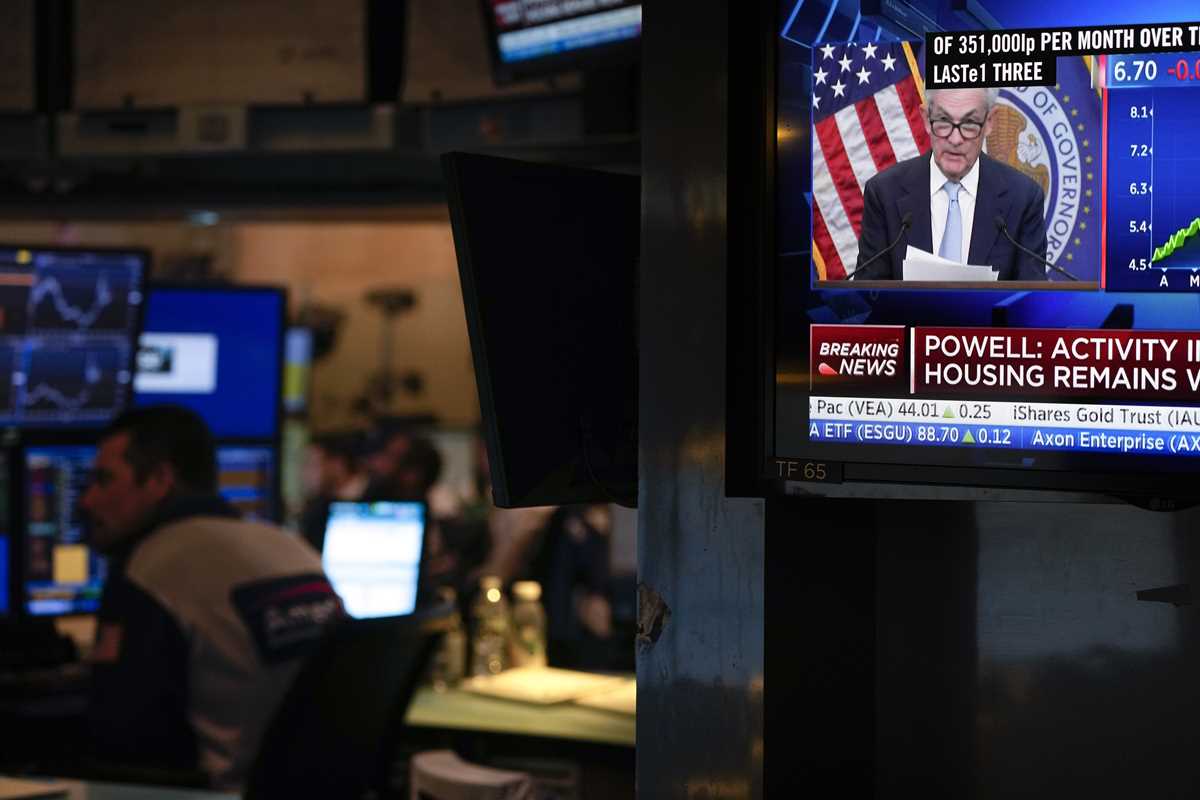 A monitor displays Federal Reserve chairman Jerome Powell's news conference while traders work on the floor at the New York Stock Exchange in New York, Wednesday, March 22, 2023. The Federal Reserve extended its year-long fight against high inflation by raising its key interest rate a quarter-point despite concerns that higher borrowing rates could worsen the turmoil that has gripped the banking system.(AP Photo/Seth Wenig)
A monitor displays Federal Reserve chairman Jerome Powell's news conference while traders work on the floor at the New York Stock Exchange in New York, Wednesday, March 22, 2023. The Federal Reserve extended its year-long fight against high inflation by raising its key interest rate a quarter-point despite concerns that higher borrowing rates could worsen the turmoil that has gripped the banking system.(AP Photo/Seth Wenig)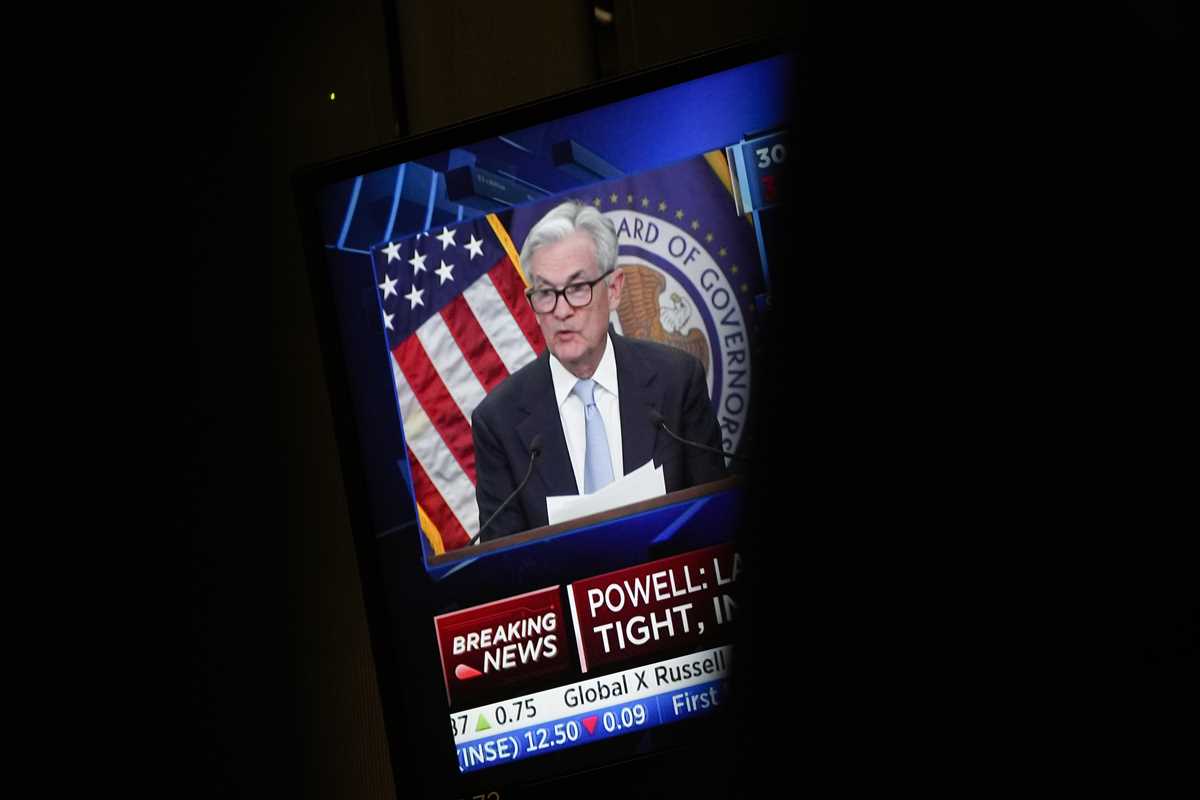 A monitor displays Federal Reserve Chairman Jerome Powell's news conference while traders work on the floor at the New York Stock Exchange in New York, Wednesday, March 22, 2023. The Federal Reserve extended its year-long fight against high inflation by raising its key interest rate a quarter-point despite concerns that higher borrowing rates could worsen the turmoil that has gripped the banking system.(AP Photo/Seth Wenig)
A monitor displays Federal Reserve Chairman Jerome Powell's news conference while traders work on the floor at the New York Stock Exchange in New York, Wednesday, March 22, 2023. The Federal Reserve extended its year-long fight against high inflation by raising its key interest rate a quarter-point despite concerns that higher borrowing rates could worsen the turmoil that has gripped the banking system.(AP Photo/Seth Wenig) Displays show Fed chairman Jerome Powell's news conference while traders work on the floor at the New York Stock Exchange in New York, Wednesday, March 22, 2023. (AP Photo/Seth Wenig)
Displays show Fed chairman Jerome Powell's news conference while traders work on the floor at the New York Stock Exchange in New York, Wednesday, March 22, 2023. (AP Photo/Seth Wenig) A display shows Fed chairman Jerome Powell's news conference while traders work on the floor at the New York Stock Exchange in New York, Wednesday, March 22, 2023. (AP Photo/Seth Wenig)
A display shows Fed chairman Jerome Powell's news conference while traders work on the floor at the New York Stock Exchange in New York, Wednesday, March 22, 2023. (AP Photo/Seth Wenig)TOKYO (AP) — Asian shares were mostly lower Thursday after the Federal Reserve raised a key interest rate, while noting the end may be near for its economy-crunching hikes to interest rates.
The Fed raised its key overnight rate by a quarter of a percentage point, the same size as its last increase, in its campaign to drive down inflation. That effort has been complicated by turmoil in the banking sector, with investors worried that more banks might fail after Silicon Valley Bank’s recent collapse.
Japan's benchmark Nikkei 225 shed 0.2% to in morning trading to 27,400.37. Australia's S&P/ASX 200 slipped 0.6% to 6,976.40. South Korea's Kospi was little changed, inching down less than 0.1% to 2,416.57. Hong Kong's Hang Seng gained 0.9% to 19,774.42, while the Shanghai Composite gave up less than 0.1% to 3,265.26.
"A risk-off tone following the recent Fed meeting has set the stage for the Asian region to follow through with some losses,” Yeap Jun Rong, a market analyst at IG, said in a commentary.
On Wall Street, the S&P 500 fell 1.6% for its first drop in three days. It closed at 3,936.97. The Dow Jones Industrial Average lost 1.6% to 32,030.11, while the Nasdaq composite dropped 1.6% to 11,669.96.
Some of the sharpest drops came again from the banking industry after Treasury Secretary Janet Yellen said she's not considering blanket protection for all depositors at all banks, unless they present a risk to the overall system.
The Fed's move was exactly what Wall Street was expecting. The bigger question was where the Fed is heading next. There, the Fed gave a hint it may not hike rates much more as it assesses the fallout from the banking industry's crisis.
Instead of repeating its statement that “ongoing increases will be appropriate,” the Fed said Wednesday that it now only sees “some additional policy firming may be appropriate.” Chair Jerome Powell emphasized the shift to ”may" from “will.”
The Fed also released the latest set of projections from its policy makers on where rates are heading in upcoming years. The median forecast had the federal funds rate sitting at 5.1% at the end of this year, up only a smidge from where it currently sits, in a range of 4.75% to 5%.
The yield on the two-year Treasury, which tends to track expectations for the Fed, tumbled to 3.46% from 4.13% just before the projections were released. It was above 5% earlier this month.
Powell said Wednesday the Fed is still focused on getting inflation down to its 2% goal and is not envisioning any rate cuts this year. He also said the Fed could begin raising rates again if high inflation makes that necessary.
Economic “indicators are still pretty resilient,” said Sameer Samana, senior global market strategist for Wells Fargo Investment Institute. “For markets to still speculate on rate cuts, it’s probably not going to take place this year if the Fed has its way.”
The Fed was stuck with a difficult decision as it balanced whether to keep hiking rates or ease off the increases given the pain felt by banks. The second- and third-largest U.S. bank failures in history have both occurred in the last two weeks.
A worry is that too much pressure on the banking system, particularly among the smaller and mid-sized banks at the center of investors’ crosshairs, would mean fewer loans made to businesses across the country. That in turn could mean less hiring and less economic activity, pushing the risk of recession still higher.
In energy trading, benchmark U.S. crude fell 83 cents to $70.07 a barrel in electronic trading on the New York Mercantile Exchange. Brent crude, the international standard lost 73 cents to $75.96 a barrel.
In currency trading, the U.S. dollar fell to 130.58 Japanese yen from 131.39 yen. The euro cost $1.0899, up from $1.0857.
___
AP Business Writer Stan Choe contributed.
Before you make your next trade, you'll want to hear this.
MarketBeat keeps track of Wall Street's top-rated and best performing research analysts and the stocks they recommend to their clients on a daily basis.
Our team has identified the five stocks that top analysts are quietly whispering to their clients to buy now before the broader market catches on... and none of the big name stocks were on the list.
They believe these five stocks are the five best companies for investors to buy now...
See The Five Stocks Here
Which stocks are major institutional investors including hedge funds and endowments buying in today's market? Click the link below and we'll send you MarketBeat's list of thirteen stocks that institutional investors are buying up as quickly as they can.
Get This Free Report